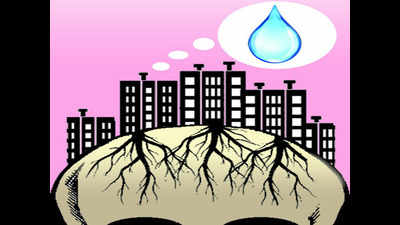- News
- City News
- delhi News
- South Delhi locality turns the table, groundwater rises 2.75ft
Trending
This story is from June 26, 2019
South Delhi locality turns the table, groundwater rises 2.75ft
In a city where overexploitation of groundwater is the norm, south Delhi's New Moti Bagh has turned the (water) tables. In this locality of bureaucrats, the groundwater level has actually risen by 2.75 feet in the past year, according to the National Building Construction Corporation.

Representative image
NEW DELHI: In a city where overexploitation of groundwater is the norm, south Delhi's New Moti Bagh has turned the (water) tables. In this locality of bureaucrats, the groundwater level has actually risen by 2.75 feet in the past year, according to the National Building Construction Corporation.
Officials of NBCC, the state-owned builder which developed the residential complex, said zero extraction of groundwater and total harvesting of rainwater were being enforced in New Moti Bagh, which had given positive results.
"We had licence for three tubewells in New Moti Bagh. But we consciously decided not to extract groundwater since 2013. We also set up a sewage treatment plant to meet the irrigation needs of the area. We take about 8-9 lakh litres of water daily from NDMC and on an average 5.5 lakh litres of treated waste water is used per day for irrigation and other purposes," an NBCC official said. He said six pits to harvest rainwater have been created to ensure that there's no run-off of rainwater from the compound.
No groundwater use, tapping rainwater helped
NBCC officials said they will soon measure undertake a similar exercise of measuring the water table in neighbouring East Kidwai Nagar, where the agency has built multi-storey flats. All tube-wells in the area have been sealed for more than four years to stop extraction of groundwater.
On Tuesday, Union urban affairs secretary Durga Shankar Mishra said zero use of groundwater and rainwater harvesting in these complexes are examples of how smart and sustainable complexes can be built across cities.
TOI has learnt that a total of 35 rainwater harvesting pits have been made operational at Kidwai Nagar. “About 13-14 pits were made operational last year and now we have completed all of them. We will measure the level of groundwater now and again in October. We are confident that there must have been some improvement since extraction of groundwater has completed stopped since 2014,” an official said.
Around 90% of Delhi has been categorised as semi-critical or critical in terms of groundwater availibility because of over-extraction in the past two decades. The water table has been dropping by 0.5 metres to 2 metres per years at different areas of the city.
Officials of NBCC, the state-owned builder which developed the residential complex, said zero extraction of groundwater and total harvesting of rainwater were being enforced in New Moti Bagh, which had given positive results.
"We had licence for three tubewells in New Moti Bagh. But we consciously decided not to extract groundwater since 2013. We also set up a sewage treatment plant to meet the irrigation needs of the area. We take about 8-9 lakh litres of water daily from NDMC and on an average 5.5 lakh litres of treated waste water is used per day for irrigation and other purposes," an NBCC official said. He said six pits to harvest rainwater have been created to ensure that there's no run-off of rainwater from the compound.
No groundwater use, tapping rainwater helped
New Moti Bagh colony houses top and middle level bureaucrats from joint secretaries to secretaries and around 3,500 people live in this residential complex.
NBCC officials said they will soon measure undertake a similar exercise of measuring the water table in neighbouring East Kidwai Nagar, where the agency has built multi-storey flats. All tube-wells in the area have been sealed for more than four years to stop extraction of groundwater.
On Tuesday, Union urban affairs secretary Durga Shankar Mishra said zero use of groundwater and rainwater harvesting in these complexes are examples of how smart and sustainable complexes can be built across cities.
TOI has learnt that a total of 35 rainwater harvesting pits have been made operational at Kidwai Nagar. “About 13-14 pits were made operational last year and now we have completed all of them. We will measure the level of groundwater now and again in October. We are confident that there must have been some improvement since extraction of groundwater has completed stopped since 2014,” an official said.
Around 90% of Delhi has been categorised as semi-critical or critical in terms of groundwater availibility because of over-extraction in the past two decades. The water table has been dropping by 0.5 metres to 2 metres per years at different areas of the city.
End of Article
FOLLOW US ON SOCIAL MEDIA










